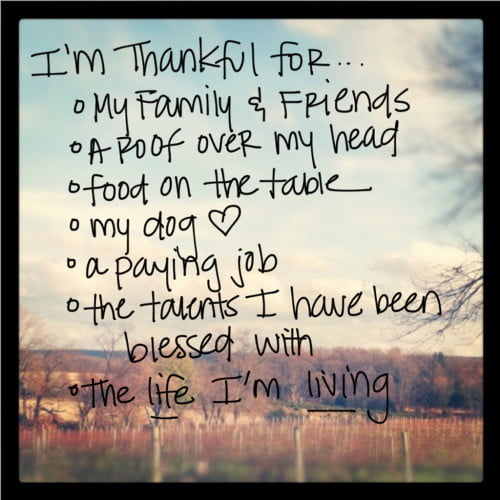 It’s Thanksgiving week in the United States, that time of year when we all start thinking a little more precisely about what it means to be thankful.
It’s Thanksgiving week in the United States, that time of year when we all start thinking a little more precisely about what it means to be thankful.
In my household, Thanksgiving always including making an "I'm thankful for..." list.
It’s a beloved pre-thanksgiving meal activity I’ve participated in since childhood when my grandmother would ask even the youngest of her grandchildren to express gratitude for something by drawing a picture, sharing a song with the family, or my cousin Ellis’ favorite, the yearly reading of the Dear Abby thanksgiving prayer.
I loved, growing up that our family even had a church service (led by the children) before we ate that included songs, skits and readings. There's no wonder I ended up as a pastor. . .
And this year:
We might say we’re thankful for our access to enjoy tasty food.
We might say we’re thankful for the love of our family or friends.
We might say that we’re thankful for our health, especially if we or someone we love has faced a health scare recently.
While I’m all for public declarations of gratitude, I’ve often felt these types of lists are robotic at best.
But what we avoid is the deeper stuff.
For it might feel just a little too vulnerable to say:
I’m thankful for the months of renewal in my marriage after years of thinking I’d made such a terrible choice in a life partner.
I’m thankful the days when my estranged friend picked up the phone to call me. Things aren’t like the used to be, but they’re getting better.
I’m thankful for one of the worst seasons at my job—days when I worked long hours and never thought my boss was never pleased—for the endurance it’s given me to know what I want next in my career.
Or, I'm thankful I finally sought help for my depression, my alcoholism, my anxiety, etc.
For they speak to real life.
Life that we all experience.
Life that is hard. Life that is messy. And, life that can ultimately be beautiful if we just allow time and grace to do it’s healing work.
I'm reading Brene Brown's new book, Rising Strong right now. And she captured me from the first couple of pages with words like this about the gifts of vulnerability.
"I believe that vulnerability-- the willingness to show up and be seen with no guarantee of outcome-- is the only path to more love, belonging and joy. . . When we own our stories, we avoid being trapped as characters in stories someone else is telling."
And I agree with her.
Our fists loosen.
Our arms unfold.
In this position, gratitude is actually transmitted one person to another.
 And in a world in need so much healing, so much love, so much hope that evil hasn't won in a month of so much terror-- don't we need more REAL gratitude?
And in a world in need so much healing, so much love, so much hope that evil hasn't won in a month of so much terror-- don't we need more REAL gratitude?I know that not every thanksgiving table is ready for this type of sharing. Some tables just aren’t safe places for you and I to lay the burdens and joys of our hearts open to, and we should be mindful of this.
But, we all can find somebody this week—somebody we can give testimony to of our REAL gratitude.
Somebody in whom we could say something like, “You know what, this has been one of the most horrible years of my life, but I am so grateful for . . . ."
Or better yet, seek out a person for whom you are grateful for and let them know how much they mean to you!
I know, for one, I’m grateful for you, dear readers of “Preacher on the Plaza.” Your interest in my words encourages me continually. Happiest of thanksgivings to you!